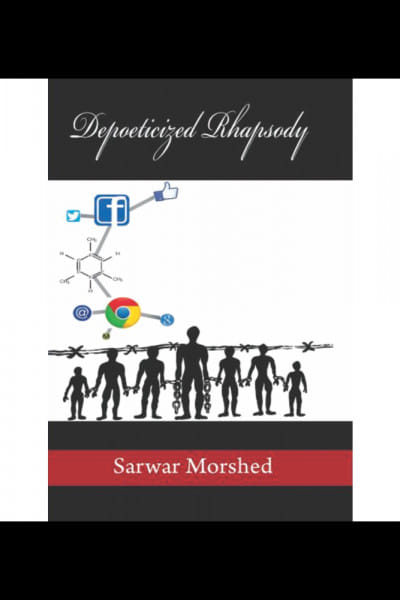Aesthetics in Poetic Pandemonium

Depoeticized Rhapsody is, oxymoronically speaking, a poetic endeavor that aims at delineating the constantly changing modern lifestyle. Justifiably enough, the book can be called a miscellanea as it accommodates diverse literary genres i.e. poetry (rhymed or free verse), epistolary and fictional pieces within the precincts of a single book. Here, you readers are going to find out how the poet views elements of both the microcosm and macrocosm through an interesting and highly personalized lens. The realms of these poems vastly extend to encompass ecology, technology, emotion, politics, pollution, transcendentalism and so on. The ever fleeting ephemeral contemporary times and the quintessence of human psyche have been arrested in an unputdownable way.
Sarwar Morshed is not only a poet – he has been writing prose (inclusive of his columns and belles-lettres) both in English and the vernacular for over the last two decades. His prolific English vocabulary is well-known among his colleagues and students at the Department of English, Chittagong University. Apart from his academic research writings, he contributes columns to national dailies (Bangladesh) and magazines published from London and Oslo. His books have been reviewed in the leading dailies of Bangladesh like the Daily Star, Daily sun, Daily Jugantor, Dhaka Courier and journals of international repute like Asiatic (Kuala Lumpur, Malaysia). Apart from the book under discussion, he has to his credit some other amazing titles like Husam Uddiner Election Khela (2009), In the Castle of My Mind (2015) and Rendezvous with Words (2015, 2nd edition is forthcoming).
As this book is a diachronic collection of the poems penned by Sarwar Morshed over the last twenty years, Depoeticized Rhapsody emerges as a dazzling kaleidoscope of our times. The poems deal with issues relevant to our local and global contexts with an outstanding blending of romance, reality and humour. Let me talk about and quote some lines from the poems that touched me most.
If you start your reading journey with the 'Contents', let me presume that you will be tempted to go through and ultimately at the end of the perusal, (if you are a language and poetry connoisseur), you will be contented. The poet has written on the plight of the RMG workers ('Cry No More, Penelope'), on the social media-addiction of the new generation ('Portrait of a Bibliophile'), about the inhuman sufferings of the Bangladeshi workers in Malaysia ('Orang Bangla'), on the lip-service paid by some 'green-enthusiasts' to the environment ('Portrait of an Envirophile') and last but not the least, the lust of the global super-powers for fossil fuels ('In Praise of Hydrocarbon'), etc. Two sub-categories of poems that arrested my attention are 'Medical Poetry' and 'Poems on IR'.
In a rather anorexic volume of poetry, Mr. Morshed has extended his poetic shadow on many topics and he has consummated the task quite wonderfully. The book has a poem with the title 'SMS' where the poet rechristens human beings as Homo Textus! In 'To Currency' how realistically he invokes money!-
You are a humanist to the core,
Brahmins can touch you and can
Kyasthas, Shudras and many more.
Christians can pocket you,
And Moslems and Buddhists and Jews
For you trans-belief travel who sues?
And in the poem 'Portrait of a Bibliophile', what a status is posted by the father warning his facebookaholic son! –
Fb, fb burning bright,
Stay not connected day and night.
Let your networking Rome in Cyber Tiber melt,
Don't poke that girl svelt.
The young readers will find some cuckooland elements in poems like 'The Physics of Love', 'Anatomical Complaints of a Lover' (highly eulogized by some native speakers of English like Barry, Moya et al), 'Yesterday's Newspaper', 'Wearing You' and 'Texting Tears'.
The three poems that I believe will touch the readers most are 'Orang Bangla', 'Cry No More, Penelope' and 'Nineveh Lands on Nimtali'. In 'Orang Bangla', the poet presents an almost videographic picture of the ordeals of an illegal Bangladeshi worker in Malaysia who reached his El Dorado on 'Tarzan visa' –
You came here through forests dense
On Tarzan visa.
Should I call your father, police?
'Hello, Inspector Tansri Wahab'-
David Smalling considers this poem as 'a true piece of anthropological write'. In 'Cry No More, Penelope' Sarwar Morshed delineates the (s)exploitation of our RMG girls by making reference to an episode in Homer's Odyssey:
"Cry no more, Penelope, weave no more,
Cease embroidering your ante-diluvium dreams
Cease weaving and weeping,
For, never will your Odysseus come.
Ye the dream-laden Penelopes
Weep and weave…….."
In 'Nineveh Lands on Nimtali' written on the Nimtali fire incident that claimed 124 lives in 2010, the poet highlights the Nietzschean spirit of our people:
Elemental gourmand,
We extinguished you and the lamentation
…….
And know ye,
Hope in human breasts is a relay-race.
The name Depoeticized Rhapsody is reminiscent of the following lines from Anne Bradstreet's 'The prologue'-
"Of Cities founded, Commonwealths begun,
For my mean pen are too superior things;….
My obscure lines shall not so dim their worth."
Here the poet is found expressing her incapability of writing on mighty topics like wars, captains, kings, or cities of commonwealths; she blames her ill-formed feeble brain and Muse for giving her "broken, blemished" words. But, we readers know how much skillful she is and the poem itself is Bradstreet's most intellectually stimulating one. Similarly, albeit the poet here has assumed Bradstreet's humility, after going through this book even the lay reader of poetry can easily perceive how much poetic Sarwar Morshed's craft is or how well-versed he is in writing poetry.
The reviewer is a Faculty, Department of English Language and Literature, University of Chittagong.

 For all latest news, follow The Daily Star's Google News channel.
For all latest news, follow The Daily Star's Google News channel. 



Comments